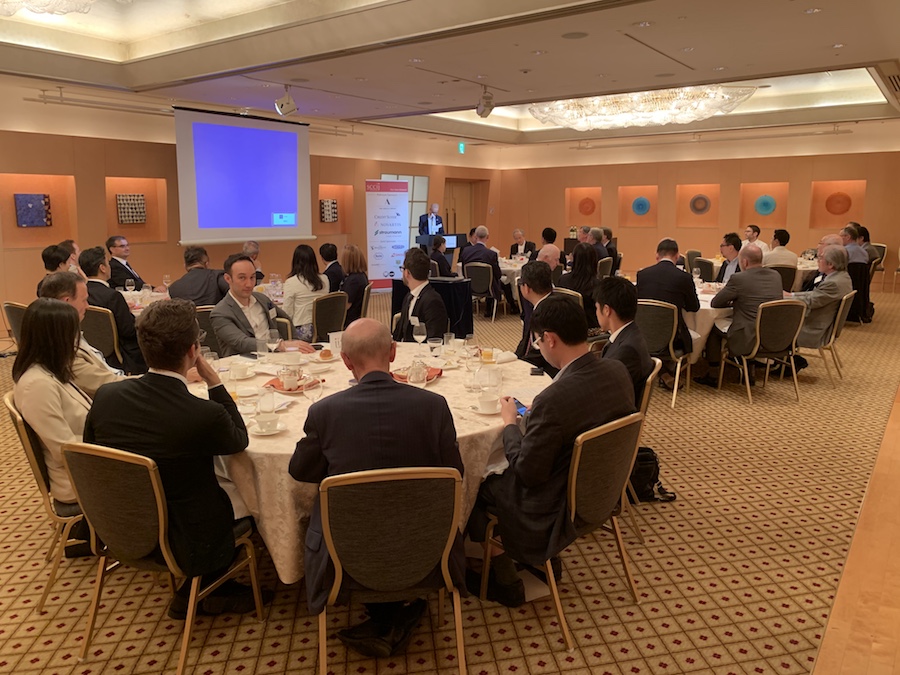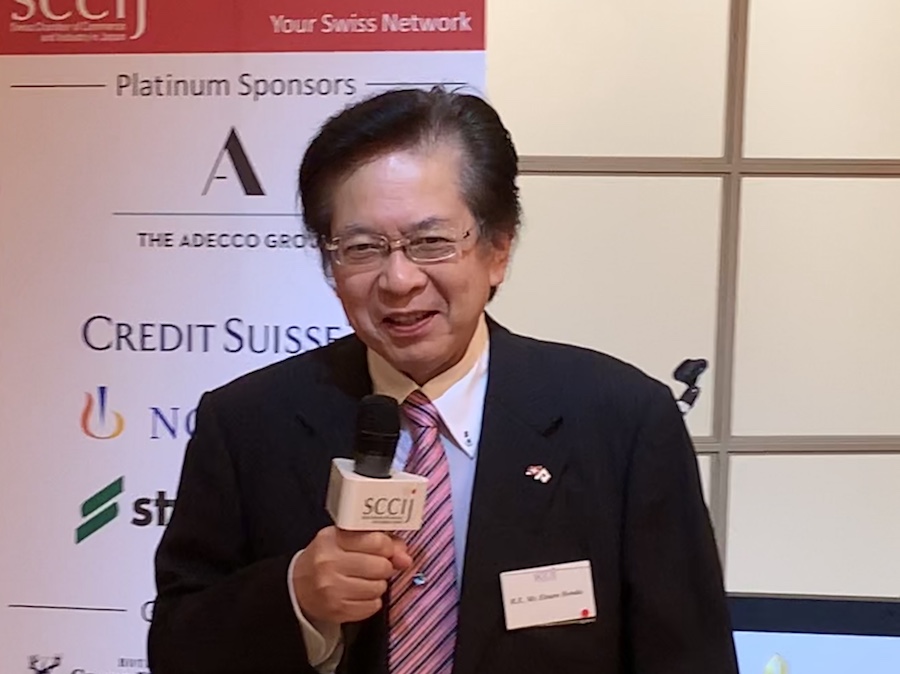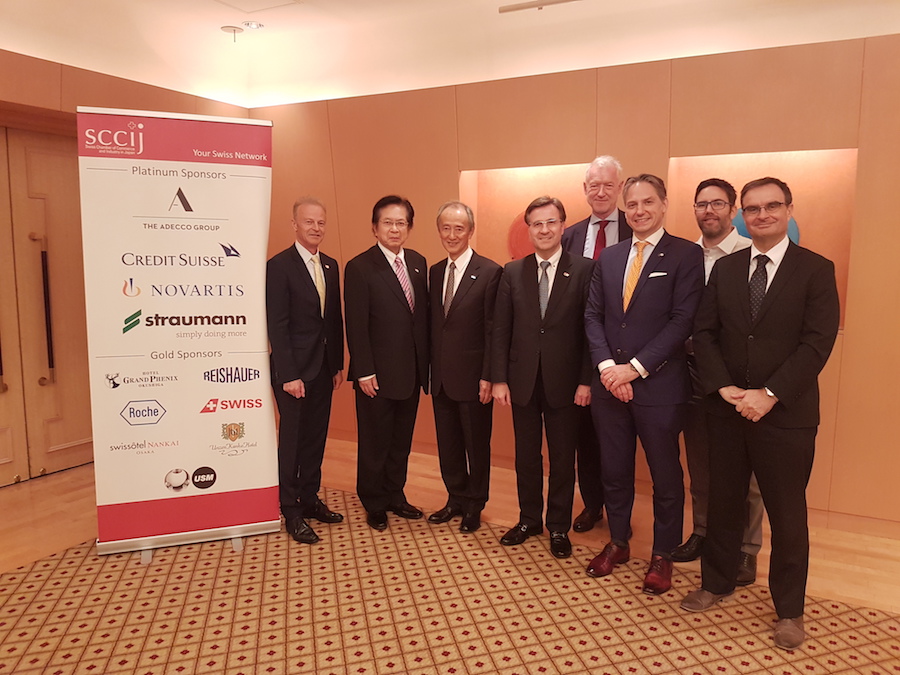Tokyo (SCCIJ) – At the June Luncheon, Mr. Etsuro Honda, Japan’s ambassador to Switzerland from 2016 to 2019, shared his views about enhancing Swiss-Japanese relations with 50 members and guests of the SCCIJ. He emphasized the substantial commonalities of the two nations despite vast differences in history, geography, the political system, and social structure by characterizing Japan and Switzerland as island nations, one surrounded by the sea and the other surrounded by the EC, the abbreviation for European Community, the predecessor of the European Union.
First Swiss lesson on arrival
Mr. Honda, a long-time government advisor on Japan’s economic policy, went to Switzerland in June 2016 after Prime Minister Shinzo Abe decided to delay a consumption tax hike for a second time. On arrival, he learned his first lesson about Switzerland: “Bern is not the capital of Switzerland, but a federal city,” he said at the onset of his luncheon speech. Power in Switzerland would be decentralized in the cantons and not concentrated in the confederation. “That impressed me very much,” he recounted. From his ambassador’s residence, he was able to enjoy a scenic view of the Alps including the famous mountains Eiger, Mönch and Jungfrau. He also could stroll through the beautiful city center of Bern full of renovated medieval buildings. The Swiss people would cherish the value of old things, whereas the Japanese tend to love new things, he told his audience. “But new things are not necessarily good for life – that is what Japan has to learn from Switzerland,” he said thoughtfully.

SCCIJ June Luncheon
Differences in national identities

SCCIJ June Luncheon Speaker H.E. Mr. Etsuro Honda
Another intriguing point his attention turned to was the different sense of community and national identity in the two countries. “As an island nation, we Japanese have a strong and natural, but unwitting national identity, whereas the landlocked Swiss are capable of harmonizing a variety of cultures and traditions into one identity,” he wondered. As an explanation, he pointed to the rise of Switzerland from one of the poorest countries in Europe into an economic powerhouse. For example, on the one hand, the rugged Alpine landscape was one reason for poverty; on the other hand, it became a resource with the advent of tourism. “Hazards turn into merits in a society if you look at them from a different angle,” he summed up his idea.
Immigration as a challenge
The different origins of national identity brought him to the topic of immigration of low-skilled workers to Japan. “The Japanese community has not been as closed as criticized,” he emphasized. For example, Japan had welcomed many professional foreigners like the many members of the SCCIJ and many foreign trainees had been accepted in Japan! “But its openness is a matter of degree because our identity is, as everywhere else, based on culture and traditions,” he added.
Hence, Japan would require a step-by-step approach to confirm that the less-skilled workers could assimilate into the Japanese national culture. “We can learn a lot from Switzerland because its community is dealing with the same problem, but on a much higher level,” the former ambassador stated.
Deflation slows down productivity
The speaker showed his passion when he picked up the topic of the high productivity of Switzerland. He questioned the reason why the Swiss business school IMD judged Japan quite low in its competitiveness ranking; this would make light of the consequences of two decades of deflation in Japan. “Under deflation, wages and investment decline concurrently which is a fatal economic disease,” he said. Thus, the corporate sector becomes less competitive. “But this will not be the end of the world,” he claimed. Due to the Abenomics policy, Japanese companies would change their mindset and become more active in terms of capital expenditure. “Someday when we see more demand, our competitiveness will improve markedly,” he predicted. “But it is still complicated to overcome deflation. In this sense, we can appreciate the warning sent by the IMD ranking.”

Members and advisors of the SCCIJ Executive Committee with luncheon speaker Etsuro Honda
Economic and political relations
The speaker also touched upon the recent visit of Swiss President Ueli Maurer to Japan who visited the G20 finance meeting in Fukuoka and met with Prime Minister Abe in Tokyo. Mr. Honda mentioned that he had arranged their first brief meeting in Davos this year. “This year, the Japanese diet set its schedule different from 2018 to allow ministers from Japan to attend the World Economic Forum in Davos,” the speaker said.
Mr. Honda also entertained his audience with an anecdote about last year’s visit of then Swiss President Alain Berset. The banquet dinner coincided with the birthday of the Swiss visitor. Thus, Mr. Honda suggested beforehand to sing “Happy Birthday” and serve the Swiss a cake with candles. The idea was accepted but without determining who would start the song. In the end, Mr. Honda missed his chance. It was the Prime Minister himself, who initiated to sing the birthday song.
Support for EPA improvement
Finally, the speaker mentioned the update of the Economic Partnership Agreement of 2009 between Japan and Switzerland. “The Swiss government compares this EPA with the new free trade treaty between Japan and the European Union and proposes possible improvements in general,” Mr. Honda said. From now, both countries would have follow-up meetings on this issue. “If we find there is room to improve, we should constructively discuss this,” Mr. Honda said. “I think we can work on that.”
He ended this speech on another positive note. “From an observatory, I watched the Matterhorn in Switzerland and noticed the contrast in its appearance and shape to Mount Fuji in Japan,” he remembered. “That contrast symbolizes for me the different characteristics between Switzerland and Japan,” he said and added: “My experience and memory of Switzerland is precious – thank you so much for the kind hospitality.”
Biography of the speaker
Mr. Etsuro Honda was born on January 12, 1955, in Wakayama Prefecture. He graduated from Tokyo University with a B.A. in Law in 1978. In the same year, he joined the Finance Ministry of Japan. Since then, he has been assigned abroad as a financial attaché in several countries, and a staff member and a board member of multi-national organizations. Just before his assignment as ambassador to Switzerland in 2016, he was an advisor to Prime Minister Shinzo Abe for the economic policy known as “Abenomics.” Since May 2019, he is an advisor at TMI Associates in Tokyo.
Text and photos: Martin Fritz for SCCIJ





























